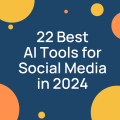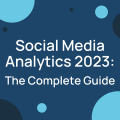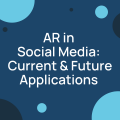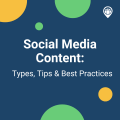Social Media Chatbots: Key Trends & Implementation Tips
Team Locowise posted on 30 November 2023
Social media chatbots are nothing new—Facebook first introduced a native messenger bot onto the platform back in 2016. But with consumers demanding instantaneous assistance now more than ever, social media chatbots are becoming critical to successful community management online.
This blog dives into the world of social media chatbots, exploring their mechanics, benefits, and the transformative role they play in digital marketing. Whether you’re a seasoned marketer or new to the digital realm, understanding the power of these virtual assistants is crucial in staying ahead of the curve. From their ability to offer 24/7 customer service to personalizing user interactions, chatbots are not just tools but strategic assets in enhancing customer experience and driving business success.
Understanding Social Media Chatbots
What are Social Media Chatbots?
Chatbots for social media are automated software applications deployed on social media platforms, designed to simulate conversation with human users. Their primary role is to streamline interactions, making them more efficient and accessible.
How do they work?
The secret behind the functionality of chatbots lies in their dual structure. They are programmed with a set of predetermined scripts, which cover a wide range of common queries and responses.
However, what truly elevates their capabilities is the integration of artificial intelligence (AI). This AI component enables chatbots to comprehend user queries, not just on a superficial level, but by understanding the nuances of human language and intent. The result is a responsive mechanism that responds in a way that feels surprisingly human.
For instance, when a user types a question or a request, the chatbot first scans its script database. If it finds a match, it responds accordingly. But for more complex or unique inquiries, the AI kicks in, analyzing the query’s context and constructing an appropriate response. This AI-driven adaptability not only enhances user experience but also ensures that the chatbot learns and evolves over time.
According to a report by Grand View Research, the global chatbot market is expected to reach $1.25 billion by 2025, growing by 24.3% annually.
A quintessential example of chatbot implementation is seen on Facebook. Many businesses leverage Facebook Messenger bots to handle customer queries. These bots are tailored to provide instant responses to common questions, facilitate bookings, or even track orders.
The efficiency here is two-fold: customers get immediate assistance, and businesses can manage their customer interactions more effectively.
The Benefits of Social Media Chatbots
Customer Service
One of the most notable advantages of social media chatbots is their ability to revolutionize customer service. Unlike human personnel, chatbots offer uninterrupted, round-the-clock service. This availability is crucial in an age where customer expectations for immediate responses have skyrocketed. Chatbots can handle inquiries and resolve issues faster than human agents, significantly reducing response times and improving customer satisfaction.
A significant 69% of consumers prefer chatbots for receiving instant responses, particularly for service-related inquiries. Additionally, 64% of internet users highlight the 24-hour service as the best feature of chatbots, underscoring the value of their continuous availability.
Engagement
Personalization is another key benefit that chatbots bring to the table. They leverage user data to tailor interactions, making customers feel understood and valued. This personalized approach not only fosters a better customer experience but also strengthens brand loyalty and engagement.
When faced with the option of waiting 15 minutes for a response from a human agent, 62% of consumers would prefer to interact with a chatbot instead. This preference indicates how chatbots, with their prompt replies and personalized interactions, are becoming a preferred mode of communication for users. Moreover, nearly 90% of customers engaged with a chatbot at least once in 2022, highlighting the growing integration of chatbots in everyday online interactions.
How to Get Started with Social Media Chatbots
Best Chatbot Tools to Try
There are a host of tools out there to help you integrate chatbots into your social accounts as well as your website. Here are a few of the most popular:
- Chatfuel
Primarily used for creating Facebook Messenger bots, Chatfuel is known for its user-friendly interface and no-code setup.
- ManyChat
ManyChat offers versatile chatbot solutions for Facebook Messenger and Instagram, integrating marketing tools and CRM systems.
- MobileMonkey
A platform that provides chatbot solutions for Facebook Messenger, SMS, and web chat, MobileMonkey has a focus on lead generation and marketing automation.
- Tidio
Tidio combines live chat and chatbot tools, supporting integrations with various platforms including social media, ideal for customer service and e-commerce.
- Botsify
A platform for creating AI chatbots for websites as well as Facebook, Botsify is known for its easy integration with various third-party applications and services.
How to Implement Your Chatbot
If implemented quickly and without forethought, your bot can end up having a negative impact on the customer experience. So, before you get started:
- Define the Bot’s Purpose: Begin by identifying what you want your chatbot to achieve. Is it for customer support, sales, or general inquiries? Understanding the purpose will guide the design and functionality of your chatbot.
- Choose the Right Platform: Select a social media platform that aligns with your audience. For instance, if your audience is predominantly on Facebook, a Facebook Messenger bot would be ideal.
- Design the Conversation Flow: Map out potential conversations, focusing on common queries and how the bot should respond. Remember, the goal is to make interactions as natural and helpful as possible.
- Test and Iterate: Before going live, test the chatbot with a small user group. Use the feedback to make necessary adjustments.
Best Practices and Tips
While chatbots can greatly enhance your social media channels, they’re not a total “set it and forget it” tool. They still need a little tweaking here and there along with regular maintenance to stay effective.
Check Interaction Quality
- Natural Conversation Flow: Ensure your chatbot’s language is conversational and engaging. Avoid overly technical or robotic responses.
- Helpfulness: The bot should provide accurate and helpful responses. Implement a feature to escalate complex issues to human agents when necessary.
- Personalization: Tailor interactions using user data to create a more personalized experience, enhancing customer satisfaction.
Conduct Regular Maintenance
- Regular Updates: Continuously update the chatbot based on changing business needs and customer feedback.
- Learning from Interactions: Analyze conversations to identify common queries and issues. Use these insights to refine the bot’s responses and decision-making algorithms.
Avoid These Common Pitfalls
- Ignoring User Feedback: Regularly gather and act on user feedback to ensure the chatbot meets user expectations and needs.
- Overly Rigid Responses: Avoid programming your chatbot with responses that are too rigid or limited. Flexibility and the ability to handle a variety of queries are crucial.
- Neglecting Testing: Continuously test the chatbot to identify and fix issues, ensuring smooth and effective operation.
The Future of Social Media Chatbots
Chatbots have been around for a while now, but what are the experts predicting in 2024 and beyond?
Advanced AI Integration
Future chatbots will increasingly leverage sophisticated AI technologies like natural language processing (NLP) and machine learning. This advancement will enable chatbots to understand and interpret human language more accurately, facilitating more intuitive and meaningful interactions.
Emotional Intelligence
Upcoming developments may include emotional recognition capabilities, allowing chatbots to respond to user sentiment, further personalizing the user experience.
Central Role in Digital Marketing
Chatbots are expected to become a core component in digital marketing strategies. They will provide personalized customer engagement at scale, support lead generation, and drive sales conversions efficiently.
Data-Driven Insights
As chatbots interact with users, they will collect valuable data, offering businesses deeper insights into customer preferences and behavior, thereby informing more targeted marketing strategies.
Taking in the Entire Social Media Engagement Picture
While chatbots are pivotal in driving engagement and enhancing the user experience on social media, they are just one piece of the larger puzzle. Optimal posting times, high-quality content, and a deep understanding of audience preferences are equally important in crafting a successful social media strategy.
This is where comprehensive analytics become indispensable. Tools like Locowise offer the depth of insight needed to fine-tune all aspects of your social media approach. For a holistic strategy, start a free trial of Locowise and discover the impact of data-driven decision-making on your social media success.





